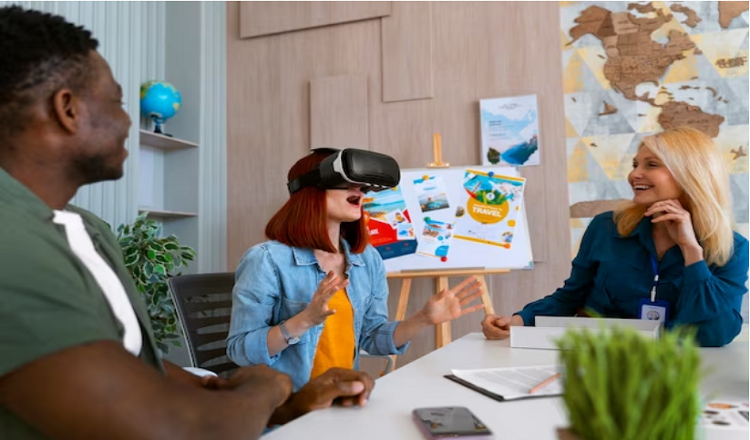Welcome, fellow travelers and adventure-seekers! Have you ever wanted to visit a far-off destination but found yourself limited by time, budget, or accessibility? Fear not, for virtual reality has come to your rescue! With the rise of virtual reality technology, travelers can now explore the world from the comfort of their own homes. Virtual reality has been a game-changer for the tourism and travel industry, offering exciting new ways to experience destinations and plan trips.
In this article, we will explore the role of virtual reality in the tourism and travel industry. We will dive into the various types of virtual reality experiences that are currently available, and how they have impacted the way we travel. You can expect to learn about the benefits of virtual reality for both travelers and businesses, as well as the challenges that this new technology poses for the industry. We’ll also take a look at some real-world examples of how virtual reality is being used in the tourism and travel industry, and what the future holds for this exciting new technology.
Whether you’re an avid traveler or a curious adventurer, this article is for you. So sit back, relax, and let’s take a journey through the fascinating world of virtual reality in the tourism and travel industry!
Being aware of the Benifits
With virtual reality technology, travelers can now explore destinations in a way that was once impossible, and businesses can offer unique and immersive experiences to their customers. Here are some of the benefits of virtual reality in the tourism and travel industry.
For travelers, virtual reality offers a range of benefits that enhance the travel experience. By using virtual reality, travelers can preview destinations before they book their trip. They can explore the city or attraction in 360 degrees and gain an understanding of what they can expect to see and do during their visit. Virtual reality can also provide a glimpse of off-the-beaten-path destinations that may be difficult to access in person. This allows travelers to make informed decisions when planning their trips, ultimately leading to a more enjoyable and stress-free travel experience.
Businesses in the tourism and travel industry also stand to benefit from virtual reality technology. Virtual reality experiences can attract more customers and create a buzz around a destination or attraction. Businesses can also use virtual reality to showcase their unique features and highlight the key selling points of their offering. Virtual reality can also provide cost savings for businesses by reducing the need for physical marketing materials and allowing them to offer virtual tours instead of in-person tours.
Real-world examples of how virtual reality is being used in the tourism and travel industry include virtual museum tours, virtual city exploration, and virtual hotel tours. Travelers can now experience destinations and attractions from the comfort of their own homes, giving them a taste of the experience before they commit to booking a trip. Types of virtual reality experiences that are currently available to travelers include 360-degree videos, virtual reality headsets, and augmented reality experiences.
Virtual reality can also help travelers plan and prepare for their trips. With virtual reality, travelers can explore their destination and create a detailed itinerary before they arrive. They can see the layout of the city and familiarize themselves with the local landmarks, making it easier to navigate and explore once they arrive. Virtual reality can also help travelers prepare for any cultural differences they may encounter, such as local customs or language barriers.
In summary, being aware of the benefits of virtual reality is crucial for both travelers and businesses in the tourism and travel industry. Virtual reality can enhance the travel experience, attract more customers, and provide cost savings for businesses. Real-world examples of how virtual reality is being used in the tourism and travel industry include virtual museum tours, virtual city exploration, and virtual hotel tours. With virtual reality, travelers can plan and prepare for their trips, creating a more enjoyable and stress-free travel experience.
Future Challenges For Travellers
The potential for virtual reality to revolutionize the tourism and travel industry is immense. With advances in technology, virtual reality is becoming more sophisticated and realistic, offering a more immersive and interactive experience for travelers. The future of the tourism and travel industry could be shaped by virtual reality, but there are also challenges that must be addressed to fully realize its potential.
Emerging trends in virtual reality include the use of artificial intelligence, haptic technology, and virtual reality social experiences. AI-powered virtual reality can create more realistic and personalized experiences for travelers, while haptic technology can provide a more tactile and sensory experience. Virtual reality social experiences can connect travelers from all over the world, creating a more social and communal travel experience.
However, there are also challenges that must be addressed to fully realize the potential of virtual reality in the tourism and travel industry. One major challenge is the cost of implementing virtual reality. The technology is still relatively expensive, and many businesses in the industry may struggle to justify the expense. There are also technical challenges, such as the need for high-speed internet and the development of compatible devices.
In addition, virtual reality poses its own set of challenges to the tourism and travel industry. Virtual reality experiences can create unrealistic expectations for travelers, leading to disappointment when the actual experience does not live up to the virtual one. There is also the concern that virtual reality experiences may deter travelers from actually visiting a destination in person, leading to a decrease in tourism revenue.
Businesses face technical challenges when implementing virtual reality, such as ensuring compatibility with different devices and platforms. They also need to create compelling and engaging virtual reality experiences that offer real value to customers. These challenges require significant investment and expertise, which can be a barrier for many businesses in the industry.
Virtual reality has the potential to create unrealistic expectations for travelers, as they may expect the virtual experience to perfectly match the real one. This can lead to disappointment and frustration when the actual experience does not live up to their expectations. It is important for businesses to manage these expectations and clearly communicate the limitations of virtual reality experiences.
In conclusion, virtual reality has the potential to revolutionize the tourism and travel industry, but there are also challenges that must be addressed. Businesses need to invest in the technology and create compelling virtual reality experiences that offer real value to customers. They also need to manage expectations and address concerns about the impact of virtual reality on the tourism industry. With careful planning and investment, virtual reality could offer a new and exciting way to explore the world
Conclusion .
In conclusion, virtual reality is set to play a significant role in the future of the tourism and travel industry. The immersive and interactive experiences that it offers have the potential to revolutionize the way we travel, from planning and preparation to the actual travel experience itself. However, there are challenges that must be addressed in order to fully realize its potential, including the cost of implementing the technology, technical challenges, and managing customer expectations.
Despite these challenges, the benefits of virtual reality in the tourism and travel industry are clear. It offers a more personalized, engaging and memorable experience for travelers, as well as opportunities for businesses to create unique and innovative experiences for their customers. With emerging trends in virtual reality, such as AI and haptic technology, the potential impact of virtual reality on the industry is only set to grow.
As a recommendation for readers interested in virtual reality in the tourism and travel industry, it is important to stay informed on emerging trends and developments in the technology. For businesses, it is important to carefully plan and invest in virtual reality experiences that offer real value to customers. For travelers, it is important to manage expectations and remember that virtual reality experiences are not a substitute for real-world travel experiences. Overall, virtual reality has the potential to revolutionize the tourism and travel industry, and it is an exciting time to be involved in the industry.




